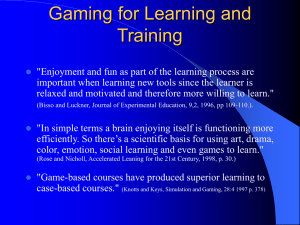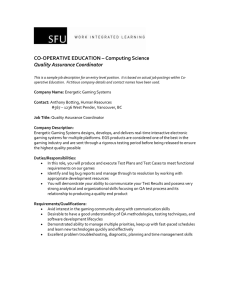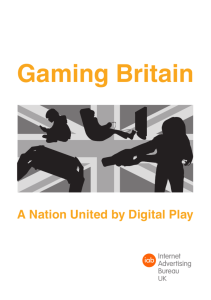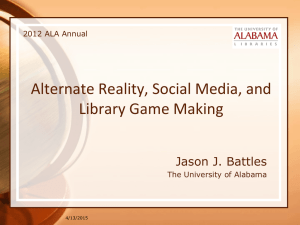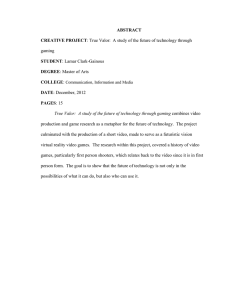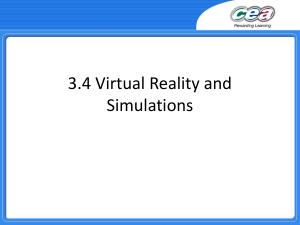Lincoln P. Bloomfield Revision I 1959 Carlisle Barracks
advertisement
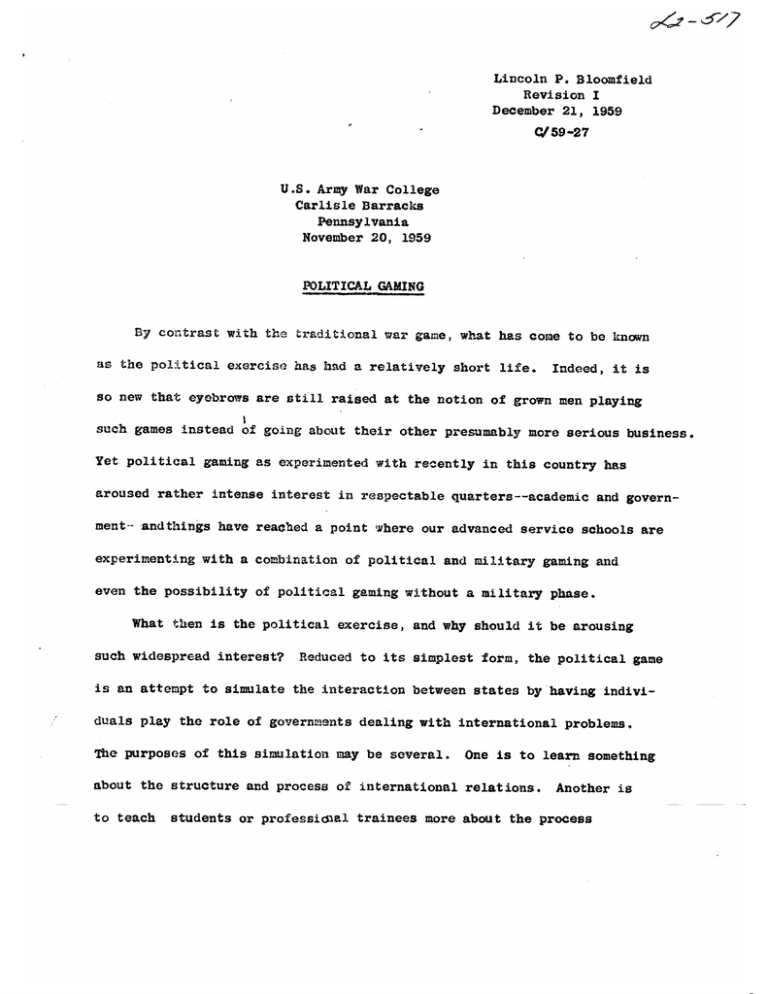
Lincoln P. Bloomfield Revision I December 21, 1959 C/ 59-27 U.S. Army War College Carlisle Barracks Pennsylvania November 20, 1959 POLITICAL GAMING By contrast with the traditional war game, what has come to be known as the political exercise has had a relatively short life. Indeed, it is so new that eyebrows are still raised at the notion of grown men playing such games instead of going about their other presumably more serious business. Yet political gaming as experimented with recently in this country has aroused rather intense interest in respectable quarters--academic and government- andthings have reached a point where our advanced service schools are experimenting with a combination of political and military gaming and even the possibility of political gaming without a military phase. What then is the political exercise, and why should it be arousing such widespread interest? Reduced to its simplest form, the political game is an attempt to simulate the interaction between states by having individuals play the role of governments dealing with international problems. The purposes of this simulation may be several. One is to learn something about the structure and process of international relations. to teach Another is students or professidial trainees more about the process 2than they can get from textbooks or lectures- Thirdly--and this is perhaps the most debated usage--the purpose may be to seek to gain insights into future possibilities and prospetets by playing through, in an admittedly arti ficiaL setting, the kiads of interna tonal1 nation at soie time in issues that might confront our the future, One can already see similarities and differences with the traditional war game. The political game has much in common with the kind of"free" war game which has evolv;ed in recent years by contrast with the 19th century type of game in books. which t-he outcmtnes were igi determined by elaborate rule But one essential difference is that traditionally war gaming.by its very nature had concentrated primarily on tactical rather than strategic situations. Even the Naval Electronic Warfare Simulator at the Naval War College, while speeding up the processes of action and evaluation, still limits the game to situations which are less than strategic in scope. Of course the politi'cal game too can center around political situations limited in time and scope and emphasizing the detailed requirements for making political and other decisions in that limited area; in other words, a tactical political game is possible. But the chief characteristic of the political exercise is that it can be global in scope, simulating not only the global political environment but also the detailed interaction of governments on a global scale. Another essential difference is that tangible material factors generally The emphasis in are decisive in the war game, given the right leadership. political gaming is on human rather than on material factors, and the prime factors tend to be qualitative rather than quanitative. Certainly both kinds of --3gaming place a premium on flexibility and the capacity to innovate, but the pay-off in political life is significantly greater with these virtues. Perhaps a final difference is that is a war game i-t is customary to assign at the close the role of victor and of vanquished on the basis of the relative position of antagonists in terms of territory exchanged, damage suffered. casualties, and so on. itself In a pol tical game a in politics victory is not a very meaningful concept, which is perhaps wh political gaming at its best is quite as frustrating as the real thing. So the value of political gaming is expressed in terms of appraisAs of con- plicated and often unresoived situations rather than in terms of concrete and measurable results, But having said all this, political gaming has in common with war gaming its central idea--that something can be gained by setting into motion an artificial simulation of a real-life conflict situation. I say setting into motion because this simulation is not at all a tableau of living statues. It is essentially dynamic and competitive, and it in a meaningful way- If it is successful, it strives to reproduce re lity sets in motion a self -sustain- ing chain reaction which develops a life and a momentum of its own, not always in the direction planned by the directors of the game 0 Americans are not the pioneers in this field,although much that is new is being learned here. I an indebted to others for the evidence that both Germany and Japan indulged in serious political gaming a generation before it engaged the interest of American scholars and operational research analysts. In the early 1930 s,on the initiative of the later General Eric von Mannstein the Wehrmacht Academy began to hold large-scale joint military and political games each year, participated in by representatives of the armed services, politicians, business men, the armaments industry, and the propaganda ministry, One known game centered around the problem of dealing with Poland while at the same time not provoking France, Czechoslovakia, or the League of Nations. The Tokyo War Crime trials revealed that the political element was a central ingredient in some of the war games sponsored by the Japanese "Institute for Total War Research. I understand that in what they called "table- top maneuvers" in the summer of 1941 the Japanese gamed the subsequent attack on the U.S. and predicted with great accuracy some of the American proposals which were later made. Apparently the results were applied to a speed-ap of Japanese preparations for war. There is also some evidence that the Soviet Union is using the political gaming technique for predictive research, though the evidence is unfortunately scanty, It would not be at all surprising, In the field of business training and research operational gaming has of course become fairly commonplace, The American Management Association has experimented with the use of computers in calculating the consequences of business decisions. Tech marketing Pro At the business schools of Harvard, M.I T., and Carnegie management games have been used as teaching aidsexposing the trainees to the tensions and requirements of the decision-making process in competitive market situations0 Various other disciplines have used this technique, The strictly political game, as I have indicated, has had only limited American usage to date0 However, it is already possible to divide its prac- titioners into two general camps, one with a general emphasis on theory, the other primarily concerned with practical applications of the technique., The more theoretical approach, pioneered by Harold Guetzkow at Northwestern University, has the explicit purpose of clarifying theories of international relations, It seeks to validate theories about the structure of international politics, and uses role-playing toward this end. The primary discipline which has shaped this technique is social psychology, with its experimental interest in face-to-face group relations. This kind of game attempts to quantify the process of international relations by assigning units of national resources, capabilities, and so on. to teams who in a series of somewhat stylized moves attempt to maximize their goals and minimize their losses. Another element which has contributed to this kind of game is the mathematical theory of games. In the Northwestern type of game care is taken to ensure than no known country is actually represented, so that the results may refer to the theoretical structure rather than to the players' notions of how nations are supposed to react. One of the virtues of this type of game is precisely in its attempt to simulate interaction not between people but between forces represented by people0 The disadvantage isphowever) equally obvious if the purpose is to expose the players to the environment of reality as faithfully as it can be simulated. My own bias is in the other direction--toward the practical uses of the gaming technique for training, research, and, hopefully, policy-making, is thus the kind of political game, in which empirical reality and operational values are emphasized What I slil it which I shall emphasize here. call the "reality game" identifies individual players as intimately as possible with the strategies and policies of real-life governments, I would not rule out the possibility of even learning about the theory of international relations through this method. But the prime aim would be either to teach people more about the way things actually happen in political conflict situations, however disorderly and untidy that process may be, or to try to anticipate and pre=test the reactions of known governments, our own, including to the situationswhich might confront us them in the future. The pioneer innovator in this reality game has been the RAND Corporation, which in recent years has experimented intensively with the political game and in important ways laid the foundation for what has followed at M.I.T., Columbia, West Point, and elsewhere where the technique has been tried, is It interesting that quite early in the process RAND's experimenters abandoned the attempt to assign numerical values to political and economic factors and to assess in' quantitative terms the relative value of alternative strategies RAND' s conclusion was that to formalize the conditions of the game and its payoff would unrealistically oversimplify the real-life world and confuse the assessments of political strateiees and tactics which emerge from the game. The way a political exercise is organized, played, and evaluated' will depend largely on the purpose for which it is played. In regard to the two training and the basic purposes I have mentioned- -the purpose of teaching or have been involved purpose of operational research or policy planning--manY who in the educational uses of the agree that the most unequivodal successes have been enthusiasm by players and political game, which has been received with great instructors alike, For the teaching of undergraduates it would be difficult to find a more vivid means of bringing home to the student what he reads in books, employing virtually all of his senses in the process0 Indeed, the mock League -7of Nations and UN Assemblies held over the years have long recognized the value of this kind of simulated participation But here I would emphasize the other educational application-.for advanced graduate students and military or diplomatic trainees who have a serious professional interest, Three elements distinguish the teaching and training gameoa)The aim trainees to the real-life tensions and pressures of political is to expose conflict situations which they can expect to confront in their careers but which so far are pretty much abstractions to them.,b)Another purpose is to demonstrate in a fairly unforgettable way the variety of factors, subtle and unsubtle, which go into the formulation of strategic decisions. This is of particular value to a military officer whose environment in the course of his training and in the earlier years of his career does not often reveal the actual weight of political, economic, and other non-military factors in decision-making or assign to thermi dominant role in the national policy a structurev This sense of perspective is self, that is achieved largely through role--playing it- to say, by the adoption by the .individpial player of the role of dipl6mat -orpolicy-maker or strategist who must deal with issues and problems in a way tha t is outside the normal experience of the military officer, Role-playing for the trainee is thus an end in itself as' well as a way to help make the political world explicit rather than implicit, For diplomatic traineee many of the same values obtain, but in the know- ledge that in terms of career such training is central rather than peripheral, For experienced practitioners, whether from the military, diplomatic, or educational realm, the experience .offered by the game is of course of little or no educational value;but it of the techniqu may thof important value in the second broad use as an adjunct to operations research or policy-planning. -8- In this context the value of gaming is than when gaming is considerably more controversial limited to explicitly educational use. The political exercises involving professional diplomats or serious students of international relations or diplomacy so far have had a variety of purposes, ranging from modest to daring. The most modest aim would be to learn more about the technique of gaming itself. This was our chief purpose in putting on M.19 'Tes Endicott House game in the fall of 1958, which for three days engaged the rather fascinated attention of a group of senior scholars refer again, and officials, aid to which I shall Therext step toward boldness would be the attempt to uncover factors in a given operational situation which might not otherwise receive priority or even awareness search. of us, in more conventional types of planning and re- The RAND experience, which has generously been made available to some assigned considerable value to this finding. Historical experience is per- haps Utpriary guide, but a political exercise can serve as a testing ground for assumptions which go well beyond the kind of self-questioning to which the scholar or planner is accustomed. By his own inventiveness the player can provide insights for himself as well as for others into the need for con tingency planning, a need which is not always satisfied in our policy-planning process, Thus one of the most useful purposes of the serious professional reality game is to help clarify premises which underlie thinking and planning but which are not often if ever put to the actual test of events, tacking such a test of events, the game sets up a laboratory in which those events can be lived through experimentally, Senior scholars have reported eye-opening perceptions of elements in their own field of specialty which only the game brought out. A further value may be the identification of new areas of potential resear.-h which may be subsequently investigated by either further gaming or by more conventional research, The ultimate temerity lies in the notion that the future can be 'redicDted by the use of gaming, Artificial simulation of events is going to distort reality in inescapable ways, are variables and intangibles in prehensively anticipated if There any human situation which cannot be com- on y because of the sheer cussedness of mankind, a quality which confounds the most elaborate prognostications. And, perhaps most serious of all, there is no assurance that culture-bound Americans, however dramatic their role-playing, are going to react identically with the kinds of meritality they are attempting to simulate, particularly those shaped in drastically different cultures and subject to pressures which we may find it impossible to evoke., lavsky method into gaming., Perhaps we should introduce the Stanis- At all events,this is an imperfection which cannot be lost sight of, There are some basic factors in designing and playing a political game which are generally common to all such experiments. with the preparation, available, The first has to do In the first instance this depends on the resources The scope of staff preparations can range anywhere from full-time for a group of people down to a couple of weeks of frantic efforts by one man with some part-time help--and I report the latter type with some feeling., The minimum essential preparations selection of personnel, include the choice of the problem, the their organization into teams representing the governments or other international forces bearing on the problem, the arrangement for physical facilities, staff organization, normally including one or preferably two umpires, setting forth the problem The choice of andr and preliminary documentation supplying necessary background. oblem is crucial, determining as it of the game in terms of geography, teams, and players., does the scope Some recent games took the whole world for theirarena, with all teams making moves and reacting right across the board-. Another type of problem centers around a single crisis in a single area, In our Endicott House game the problem was a crisis caused by an anti.-regime coup in Poland, We therefore had to assign maximumi strength to the American, Soviet, and Eastern European teams. But at the same time since we anticipated that the problem would go before the United Nations, it was necessary to have teams representing aggregates of countries in Africa, Asia, and Latin America, The choice of problem, thenv.ill 'detiermine whether the game takes place primarily in the form of bilateral negotiations between governments or whether its emphasis is chiefly settings or both. in the United Nations or other interna tional conference The Berlin games put on for some of our students at M.I .T. centered around rather interminable meetinp of the foreign ministers, with emphasis on a small number of dominant governments and individual negotiators.. In some of the RAND games and at the Naval War College there were only two or three teams, with the game managers or umpires attempting to supply the initiatives and reactions of all countries unrepresented. There were10 teams at Endicott House. The choice of problem will also determine whether the game is to be primarly political or military in its problem such as Poland or Berlin cr Formosa is tone, chosen, or the other has no real alternativre but to Commit its If a going abomb-linen and if srategi one party forces, On the other a political game may be over in the first five minutes hand, one of the insights of our exercise at Endicott House is that such a bomb-line problem does not necessarily lead to hostilities if the governmental teams faithfully seek to duplicate the probable actions of the governments concerned. Of course. tbe organiers osa rig the gSm to eliminate the alternative of military action, but this would impeee on the players an artificial inhibition which can be destructive of the chief values of the exercise. An important choice for the designers concerns the internal organization of team. In an educational game it is very useful to expose the internal decision-making process of a society such as our own by a formal division of labor, including civilian and nilitary executive leadership, Congressional and public opinion, and so on. A simpler format is the division of the .Anerican team into component parts of the executive community, perhape even just two the National Security Council and Joint Chiefs of Staff. For the pro- fessional game this internal division of laboils useful primarily to ensure that all significant factors are being reflected in basic stra- tegi c decis ior* simulated in the game, Another major decision is on the relation of game time to real'time Time can with unearthly ease be compressed, expanded, or futwe. and made past, present, Some games have been projected into a future time, partly to avoid having the players confused by contemporary events. taken the world as it is, letting the game be the players read in the New York Times every morning. Other games have influenced by what In either case there is a tendency to develop a sclisoid mentality trying to sort out what is happening in the game and what is happening in real life. This inci- dentally illustrates the degree of commitment which individuals acquire in these games. To someone who is not a psychological expert it is no. thing short of astonishing to see grown men abandon their families, forget their worldly obligations, and engage their personalities and intellects so completely in a simulated role. Perhaps show business learned this a long timepo 0o Once it has been decided whether the game ist be set in the present, a year from now, or five years from now-or conceivably five years ago if the purpose is to replay an earlier situation to see how it might have been handled differently--the scenario can be written, describing the world as the players are to find it on the opening of the game. The ratio of the game day to real time can also be juggled with astonishing ease. One hour of game time can represent a week or a month of real time, with the umpire intervening to say what has happened in the interim pole the real events of a single At the opposite crucial day of history can be played and replayed, discussed, and then played again, all over a considerable period of elapsed time, A crucial decision is whether the strategy to be followed by players is to be realistic or what is called a "deviant strategy". In other words, all players could seek to reproduce as faithfully as possible the probable reactions of known governments; or one team could be freed from such inhibitions, playing an "optimal" or "normative" strategy. In this connection it is of great importance that at the outset, as soon as they learn the problem and before the play begins, required to put on paper their basic strategic goals, the situation, and their appreciation of how it can serve as a standard of comparison in teams be their estimate of will probably unfold, the post-mortem session, This and it teaches -13- much about the validity of the premises and appraisals on the basis of which a given team has operated. I consider it useful to withhold from the players advance knowledge of the actual problem, particularly where the game centers around k crisis situation to which the players should react as in real life, and to conceal background papers and maps which identify the problem until the game actually commences. The final body of information launching the game often takes the form of a series of hypothetical press releases, starting perhaps at D minus 2 and gradually picking up momentum as the crisis unfolds, with dispatches issuing from capitals and communiques from chancelleries, military disposition leakings, and other earmarits of the familiar flap proceeding to the point where the game starts and the machine takes off under its own momentum, Clearly, the role of umnires is vital, In the RAND games two non-playing teams were used, one a team of umpires who had the function of ruling on the plausibility of moves which were submitted to them in writing before being executed, and the other a so-called "nature" team whose function was to introduce new factual elements, generating new crises in other parts of the world, and in general stirring up the mud when things got slow, Inother games the functions were combined, In a game at MIoT. a world newspaper called the Weltbild was produced each night by the instructional staff, presenting to the players at the beginning of each day the hypothetical events which had taken place overnight and would seriously affect their plans for the day, This technique had been refined to the point of having a simulated James Reston, a Walter Lippmann, in his own inimitable style, or a Joseph Alsop commenting The mechanics of reproducing and distributing documents and generally keeping the flow of information moving is one which would not tax a large extablishment, and indeed an overly efficient administrative operation poorly the real-life lags in information which so often bedevil simulates those who have to make decisions, from the President down to the squad leader. The physical layout is important; small a space if a game is played Ain too it will maximize thea sense of unreality by speeding up information as well as making it difficult to hold realistic consultations0 At Endicott House we were treated to the spectacle of foreign ministers striding in and out of one foreign office after another and conducting multiple negotiations in a short space of time which even the late Mr. Dulles would have envied as an exercise in personal diplomacy The use of the international conference technique, apart from being a wholly realistic episode in the unfolding of many an international crisis, has the virtue of enabling a large number of players to participate and of creating a setting in which multiple diplomacy take place, can realistically Reality, however, is maximized only if corresponding govern- ment headquarters are established apart from the conference eso that negotiators can consult with their governments and receive instructions on the basis of which the tactical negotiations can proceed with realism, Practically all who have taken part in these experiments agree that the post-mortem session following the game is perhaps the most valuable event of the political exercise0 Here the players are debriefed, and here at last the strategies of the individual teams are exposed to general view and dissected.. A post-mortem session immediately following the game is not entirely satisfactory; coming out -.f a role is a little bit like -15- coming out of a deep sleep after a particularly vivid dream. It take. times tor the carry-over of emotional content from the game to reelt to wear off . But given adequate time and conducted skillfully, the post- mortem can supply the decisive insights about the planning and action process in the very way in which the game Uke the reality it asimlate* cannot. On the basis of the evidence so far it is difficult to draw any definitive conclusions about the political game as a means of analysing alternative national strategies. Above all, uncertainty lingers about the payoff in the realm of prediction. In games I have cited there have been some startling anticipations of events which subsequently took place in the real world. The 1956 RAND game at Santa Monica involved the with.. drawal of minor Soviet contingents from Germany, some profound differences among the NATO powers regarding the use of force vise-1vis Nasserlq Egypt, and the rapidity of Soviet technological advances, all of which were to appear in the press shortly. Some M.L T. students in 1958 antici- pated the forthcoming rebellion of French colons and military elements in Algeria, a move about which the umpires were sufficiently skeptical as to question its plausibilit One suggestion which has appealed to some of us is the possibility of running simultaneous games so that their outcomes may be compared, Another possibility would be to have a single problem gamed, simultaneously discussed by conventional planning methods around a table, and given a third check in the form of one mad genius in a closet trying to anticipate the whole thing Aingle-hanedly. The built-in limitations in using Americans to play the roles of foreign countries could perhaps be met by having nationals of the country play on their own home team, so to speak, perhaps in combination with Americans, On the other hand I have seen great value in placing an extremely anti-American foreign student in the role of American Secretary of State, watching with fascination the transformation as he came up against the crisis and was required to act responsibly in his assigned role. He came out of the game chastened and even grudgingly admiring the performance of the current Secretary of State (although the price was to have his antagonism transferred to me for having done this to him ) It us, is not easy to predict where this new technique is going to lead There is a new game on the market called "Diplomacy, The Game With the Human Element"phereby anyone with $6,,95 to spend can happily negotiate, denounce, threaten, spread rumors, or declare ware the wrong occupation. Perhaps we are all in There might be great value in Tsnus pr-eu u v summit meeting, or in examining possible alternatives in the event of in replaying the Hungarian revolution Nasserism in the Panama Canal zone, or of 196 with alternative Western strategies. Given the appropriate faci- be run through successive polilities and staff, a cold war problem might tical and limited military stages. The future uses of the political game need to be approached with prudence, and I do not expect to be able to claim that as British hot wars were won on the playing fields of Eton, American cold wars are going to beuon on the playing fields of M.ILT. simulated in a game. Reality can of course only be But there are two prime values which group operations of this kind do bring to analysis of foreign policy problems, One is the benefit of interaction between several minds--which can of course also be achieved around the conference table, The other is th-e rather more complex set of benefits which flow from the dynamics of this interaction in the form of role- playing, generating a self-sustaining reaction that develops its own course independent of the limits or boundaries with which one starts. There is a potent value in unpredictability, and in exposure to the antagonistic will of another who is operating on the basis of very different assumptions, Neither of these values can be derived from solitary meditation or cooperative discussion, answer is possible to the general question "Is In this sense, an affirmative political gaming useful?" and this insight emerges as the clearest finding from our experimentationo

